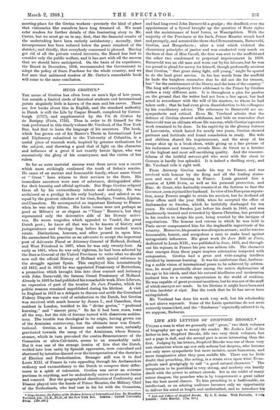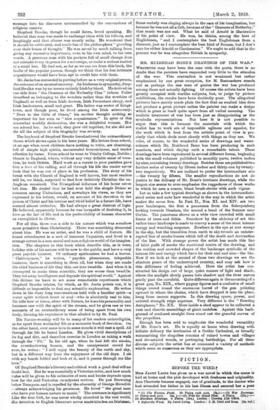LIFE AND LETTERS OF STOPFORD BROOKE.•
UmEss a man is what we generally call " great," two thick volumes of biography are apt to weary the reader. Mr. Jacks's Life of his father-in-law, Stopford Brooke, fills two very thick volumes, but not a page is dull, and the second part is more interesting than the first. Judging by his letters, Stopford Brooke was one of those very rare characters whom age not only softens but deepens, who become not only more sympathetic but more incisive, more humorous, and more imaginative after they pass middle life. There can be little doubt that preaching, like acting, is a strain even upon what Evan- gelicals used grudgingly to call " a good natural character." The temptation to be pontifical is very strong, and modesty can hardly dwell with the power to attract crowds. Set in the midst of many minor dangers, the preacher who is by temperament a great talker has the best moral chance. To him preaching to a fashionable, an intellectual, or an adoring audience becomes only an opportunity to deliver his mind at length and undisturbed, and to introduce his • Life and Letters of Stopford Brooke. By L. P. Jacks. With Portraits. 2 voli London : John Murray. [15s. net.'
message into his discourse untrammelled by the conventions of religious reserve.
Stopford Brooke, though he could listen, loved speaking. He believed that man was made to exchange ideas with his fellows, and laughingly said that silence was mostly sulks. He wondered that it should be cultivated, and made fun of the philosophers " growling over their bones of thought." He was saved by much talking from giving any excessive importance, even in his own mind, to his own words. A generous man with his pockets full of small change does not mistake every sixpence for a sovereign, or make a serious matter of a small loss. He had not, so far as we can see from this book, the faults of the popular parson, though we think that his less intimate acquaintance would have been apt to credit him with them.
Mr. Jacks has succeeded in putting before us a very original person, the outcome of an unusual ancestry. An Irishman in sympathy, Stop- ford BroOke was by no means entirely Irish by blood. He derived on one side from " the Graemes of the Netherby Clan " (whom Fuller described as belonging to the wonders rather than the worthies of England) as well as from Irish doctors, Irish Protestant clergy, and ,Irish landowners, small and great. His father was rector of Kings- town, and though poor, he lived among the Irish aristocracy. " Next to the Gifts of Grace," his mother thought nothing so important for her sons as " nice acquaintance." In spite of this somewhat worldly declaration, she was a delightful woman. Her son adored her. As he said, they grew old together, for she did not die till the subject of this biography was seventy.
The boyhood of Stopford. Brooke foreshadowed the extraordinary charm which shows again in his later years. His letters from school, at an age when most children have nothing to write, are charming, full of simple high spirits, unconcealed homesickness, and tender affection by tures. From school he went to Trinity College, Dublin ; thence to England, where, without any very definite sense of voca- tion, he took Orders. Hard work as a curate in poor parishes gave him a love of his calling, and all through his life the reader never feels that he was out of place in his profession. The story of his break with the Church of England is well known, but most readers will be, we think, surprised to find how definitely Christian the ex- Anglican remained.. The Evangelical influence of his home never left him. He denied that he had ever held the simple Deism so common among Unitarians, and nowadays his views, as they are expressed in his letters, would, on account of his devotion to the person of Christ and his intense and vivid belief in a future life, have seemed almost orthodox. He had always a great distrust of logic. He believed, apparently because he was incapable of doubting it, in love as the law of life and in the perfectibility of human character as exemplified in Christ.
For all this, there was a side to his nature which was somehow more primitive than Christianity. There was something elemental about him. He was an artist, and he was a child of Nature. He found refreshment in a sort of innocent Paganism, and lived to a strange extent in a non-moral and non-religious world of the imagina- tion. The chapters in this book which describe this, as it were, holiday side of his nature will be new to the public, and have a very great psychic interest. Of ordinary spiritualism he had a horror. " Clairvoyance," he writes, " psychic phenomena, telepathic business, there is something in them all, but when they are made the chief business of life they thin out into twaddle. And when it is attempted to make them scientific, they are worse than twaddle. They rot away intelligence and degrade the spiritual world." Against this dictum we have to set some remarkable experiences which Stopford Brooke relates, for which, as Mr. Jacks points out, it is difficult or impossible to find any scientific explanation. He writes down in his diary long conversations held with a familiar spirit—a water spirit without heart or soul—who is absolutely real to him. Ile tells how at times, alone with Nature, he loses his personality and becomes one with the spirit of the stream, and he gives one or two accounts of an extraordinary sense of being apart from his own body, likening his experience to that alluded to by St. PauL His Nature-worship will be to many of his readers unintelligible, as far apart from workaday life as a monastic book of devotion. On the other hand, over some men in some moods it will cast a spell. All through his life he hated London. He gives vivid descriptions of its fog and dirt, and describes exercise in London as taking a walk through the " Pit." In his old age, when he had left the smoke, the overshadowing houses, and the omnipresent crowd for ever, he writes : " I still enjoy the beauty of the earth and sky, but in a different way from the enjoyment of the old days. I sit with my hands folded and look at it, and it passes through me like love."
Of Stopford Brooke's literary and critical work a good deal will no doubt last. But he was essentially a Victorian critic, and how much value will be given to his estimates of men and books depends upon how far the mid-Victorian standpoint revives. He put Browning below Tennyson and is repelled by the obscurity of George Meredith — always acknowledging his greatness. He loved " the great men who have put human nature to music." The sentence is significant] Like the true Celt, he was never wholly absorbed in the real world. His devotion to English literature never madelnin less an Irishman. Some melody was ringing always in the ears of his imagination, but because he was not all a Celt, because of the " Graemea of Netherby," that music was not sad. What he said of Arnold is illustrative of his point of view. He was, he thinks, among the beat of Englishmen, " and I contemplate the best Englishman from a distance, just as I contemplate the best kind of Roman, but I don't care for either Arnold or Cincirmatus." We ought to add that in the present war he was altogether British in sympathy.



























 Previous page
Previous page